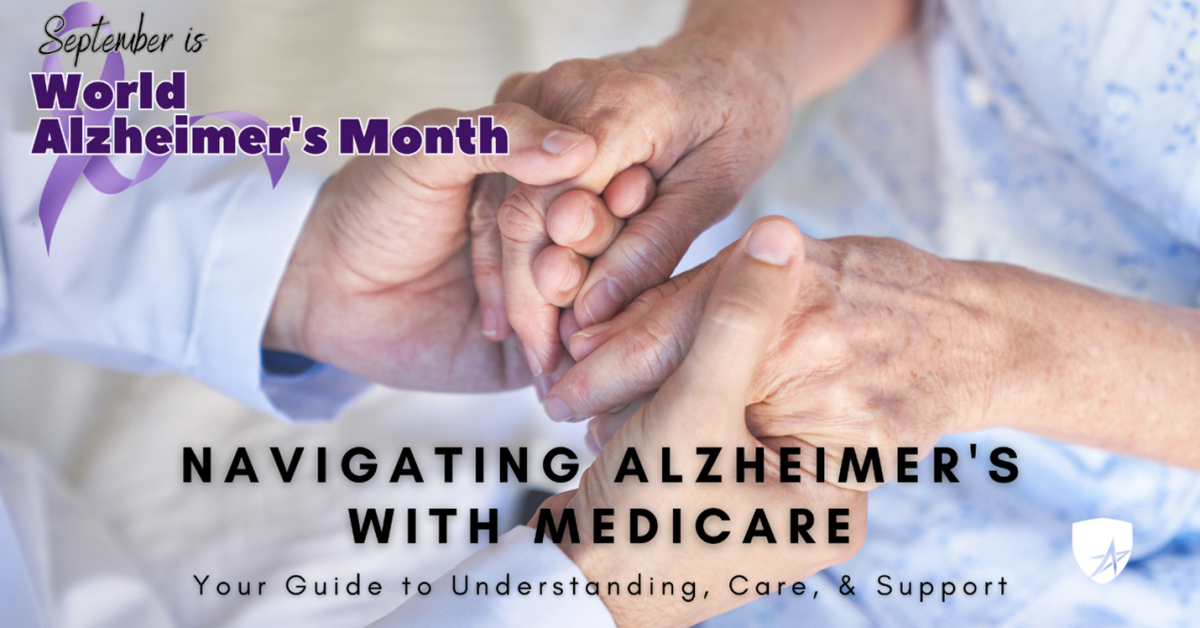September is World Alzheimer’s Month, so we feel it’s vital to equip ourselves, our clients, and community with knowledge about this condition and how Medicare can lend a helping hand.
Whether you’re directly impacted or simply curious, we’re here to provide you with clear, concise information to navigate this journey together.
Understanding Alzheimer’s:
Alzheimer’s is a progressive brain disorder that affects memory and thinking. It’s common among seniors and can be challenging. But fear not – knowledge is power, and we are here to shed light on what to look for and how to seek help.
Spotting the signs Spotting the Signs:
- Memory loss disrupting daily life
- Challenges in planning or solving problems
- Difficulty completing familiar tasks
- Confusion with time or place
- Trouble understanding visual images or spatial relationships
- New problems with words when speaking or writing
- Misplacing things and losing the ability to retrace steps
- Decreased or poor judgment
- Withdrawal from work or social activities
- Changes in mood and personality
- Confusion with time or place
- Trouble understanding visual images or spatial relationships
- New problems with words when speaking or writing
- Misplacing things and losing the ability to retrace steps
- Decreased or poor judgment
Understanding Your Medicare Coverage and preventative services:
Wondering how Medicare fits into the picture? We’ve got you covered. Discover what cognitive screenings and tests are covered by Part B, and how Part D can assist with certain medications related to cognitive symptoms.
Cognitive Impairment Screening: Medicare Part B provides coverage for cognitive impairment screenings for beneficiaries who exhibit symptoms of cognitive decline or are at risk for cognitive impairment. These screenings can help identify early signs of conditions like Alzheimer’s disease. Your healthcare provider can perform these assessments during your annual wellness visit or at other times when necessary.
Neurological Services: Medicare Part B covers a wide range of neurological services, including consultations and evaluations with neurologists or other specialists. These services are essential for diagnosing and managing conditions affecting brain health.
Alzheimer’s Medications: Medicare Part D, which is the prescription drug coverage portion of Medicare, covers medications used to treat Alzheimer’s disease. Common Alzheimer’s medications, such as cholinesterase inhibitors (e.g., donepezil) and N-methyl-D-aspartate (NMDA) receptor antagonists (e.g., memantine), are often included in Part D formularies. Beneficiaries with Alzheimer’s can enroll in a Part D plan to help cover the costs of these medications.
It’s important to note that specific coverage details can vary depending on your Medicare plan, including whether you have Original Medicare (Part A and Part B) with a separate Part D prescription drug plan or if you have a Medicare Advantage plan (Part C) that may bundle medical and prescription drug coverage. Therefore, it’s crucial to review your plan’s benefits, formulary, and any prior authorization requirements with your Medicare provider or plan administrator to understand the extent of coverage for Alzheimer’s-related services and medications.
Living Well and Planning Ahead:
Living with Alzheimer’s requires adapting to new routines and adjusting. Learn how staying mentally and socially active, maintaining a healthy diet, and engaging in regular exercise can contribute to your well-being. Also, get insights into planning for the future, including legal and financial aspects.
Support for Caregivers:
For caregivers, your role is invaluable. Learn about respite care options covered by Medicare and find out about support groups that can provide guidance and comfort. Alzheimer’s can have a significant impact on mental health. Medicare covers mental health services, including counseling and therapy, which can be beneficial for individuals with Alzheimer’s and their caregivers.
Local Support Groups: Local Alzheimer’s support groups and community organizations often host informational sessions and provide resources for individuals and caregivers facing Alzheimer’s-related challenges. These groups can offer valuable connections and practical advice.
Join the Movement: World Alzheimer’s Month is a time to raise awareness and show our solidarity. Let’s share information, stories, and encouragement to create a network of understanding and compassion. Together, we can make a difference in the lives of those affected by Alzheimer’s. Stay tuned for more insightful posts throughout this special month. Remember, you’re not alone on this journey – together, we’ll navigate the path ahead. Please contact us to learn more on preventative care services, and Alzheimer’s medications that may be covered under Medicare Part D.
Download this Helpful Guide for More Information
Two reliable resources related to Alzheimer’s disease and Medicare coverage:
Alzheimer’s Association: Website: www.alz.org This website is a wealth of information on Alzheimer’s disease, offering resources for patients, caregivers, and those interested in learning more. You can find information about symptoms, diagnosis, care options, and support services.
Medicare Official Website: Website: www.medicare.gov The official Medicare website provides comprehensive information about coverage and benefits for Medicare beneficiaries. You can learn about Medicare Part B coverage for cognitive assessments and screenings, as well as Part D coverage for certain medications related to cognitive symptoms. These resources can offer you detailed information and guidance to help you better understand Alzheimer’s disease and how Medicare can support you or your loved ones.

